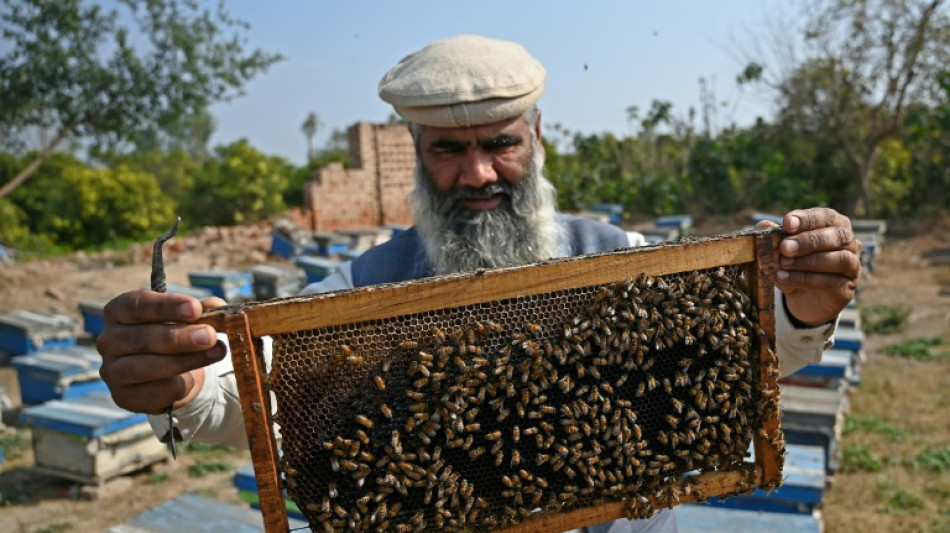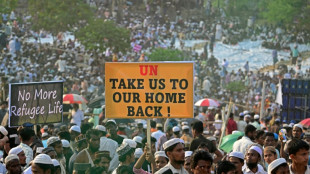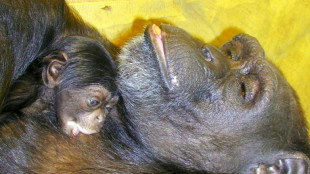
-
 India and Germany eye defence industry boost to ties
India and Germany eye defence industry boost to ties
-
'I know the pain': ex-refugee takes over as UNHCR chief

-
 US prosecutors open criminal probe into Federal Reserve
US prosecutors open criminal probe into Federal Reserve
-
Rohingya 'targeted for destruction' by Myanmar, ICJ hears

-
 'Genius' chimpanzee Ai dies in Japan at 49
'Genius' chimpanzee Ai dies in Japan at 49
-
Trump says US will take Greenland 'one way or the other'

-
 Asian equities, precious metals surge as US Justice Dept targets Fed
Asian equities, precious metals surge as US Justice Dept targets Fed
-
Myanmar pro-military party claims Suu Kyi's seat in junta-run poll

-
 Fed chair Powell says targeted by federal probe
Fed chair Powell says targeted by federal probe
-
Trailblazing Milos Raonic retires from tennis

-
 Australia recalls parliament early to pass hate speech, gun laws
Australia recalls parliament early to pass hate speech, gun laws
-
'One Battle After Another,' 'Hamnet' triumph at Golden Globes

-
 Japan aims to dig deep-sea rare earths to reduce China dependence
Japan aims to dig deep-sea rare earths to reduce China dependence
-
Top UN court to hear Rohingya genocide case against Myanmar

-
 US sends more agents to Minneapolis despite furor over woman's killing
US sends more agents to Minneapolis despite furor over woman's killing
-
Trump says Iran 'want to negotiate' after reports of hundreds killed in protests

-
 Bangladesh's powerful Islamists prepare for elections
Bangladesh's powerful Islamists prepare for elections
-
NBA-best Thunder beat the Heat as T-Wolves edge Spurs

-
 Ukraine's Kostyuk defends 'conscious choice' to speak out about war
Ukraine's Kostyuk defends 'conscious choice' to speak out about war
-
Trump says working well with Venezuela's new leaders, open to meeting

-
 Asian equities edge up, dollar slides as US Fed Reserve subpoenaed
Asian equities edge up, dollar slides as US Fed Reserve subpoenaed
-
Hong Kong court hears sentencing arguments for Jimmy Lai

-
 Powell says Federal Reserve subpoenaed by US Justice Department
Powell says Federal Reserve subpoenaed by US Justice Department
-
Chalamet, 'One Battle' among winners at Golden Globes

-
 Turning point? Canada's tumultuous relationship with China
Turning point? Canada's tumultuous relationship with China
-
Eagles stunned by depleted 49ers, Allen leads Bills fightback

-
 Globes red carpet: chic black, naked dresses and a bit of politics
Globes red carpet: chic black, naked dresses and a bit of politics
-
Maduro's fall raises Venezuelans' hopes for economic bounty

-
 Golden Globes kick off with 'One Battle' among favorites
Golden Globes kick off with 'One Battle' among favorites
-
Australian Open 'underdog' Medvedev says he will be hard to beat

-
 In-form Bencic back in top 10 for first time since having baby
In-form Bencic back in top 10 for first time since having baby
-
Swiatek insists 'everything is fine' after back-to-back defeats

-
 Wildfires spread to 15,000 hectares in Argentine Patagonia
Wildfires spread to 15,000 hectares in Argentine Patagonia
-
Napoli stay in touch with leaders Inter thanks to talisman McTominay

-
 Meta urges Australia to change teen social media ban
Meta urges Australia to change teen social media ban
-
Venezuelans await political prisoners' release after government vow

-
 Lens continue winning streak, Endrick opens Lyon account in French Cup
Lens continue winning streak, Endrick opens Lyon account in French Cup
-
McTominay double gives Napoli precious point at Serie A leaders Inter

-
 Trump admin sends more agents to Minneapolis despite furor over woman's killing
Trump admin sends more agents to Minneapolis despite furor over woman's killing
-
Allen magic leads Bills past Jaguars in playoff thriller

-
 Barca edge Real Madrid in thrilling Spanish Super Cup final
Barca edge Real Madrid in thrilling Spanish Super Cup final
-
Malinin spearheads US Olympic figure skating challenge

-
 Malinin spearheads US figure Olympic figure skating challenge
Malinin spearheads US figure Olympic figure skating challenge
-
Iran rights group warns of 'mass killing', govt calls counter-protests

-
 'Fragile' Man Utd hit new low with FA Cup exit
'Fragile' Man Utd hit new low with FA Cup exit
-
Iran rights group warns of 'mass killing' of protesters

-
 Demonstrators in London, Paris, Istanbul back Iran protests
Demonstrators in London, Paris, Istanbul back Iran protests
-
Olise sparkles as Bayern fire eight past Wolfsburg

-
 Man Utd knocked out of FA Cup by Brighton, Martinelli hits hat-trick for Arsenal
Man Utd knocked out of FA Cup by Brighton, Martinelli hits hat-trick for Arsenal
-
Troubled Man Utd crash out of FA Cup against Brighton


Plan B: Pakistan beekeepers widen pursuit of flowers
Under a dry, smoggy sky, a beekeeper in Pakistan's Punjab province carefully loads boxes filled with tens of thousands of bees onto the back of a truck.
Together they will travel 500 kilometres (around 300 miles) in an increasingly desperate chase to find flowering plants, clean air and moderate temperatures for honey production as climate change and pollution threaten the industry.
"We move the boxes according to where the weather is good and the flowers bloom," Malik Hussain Khan told AFP, standing in a field of orange trees whose blossoms arrived weeks late in February and lasted only for a few weeks.
Pakistan's beekeepers typically move seasonally to spare their charges stifling heat or freezing cold.
Summers are spent in northwestern Khyber Pakhtunkhwa province, and winters in central Punjab province.
But weather patterns made unpredictable by climate change -- coupled with some of the worst pollution in the world -- mean beekeepers must move more frequently and travel further.
This winter was marked by soaring, hazardous smog levels that the government declared a national disaster. Research has found air pollution can make it harder for bees to locate flowers.
Diminished rainfall, meanwhile, failed to clear the choking air and triggered drought warnings for farmers.
"Almost half of my bees died when the smog and fog hit this winter because they could not fly. There was hardly any rain," said Khan, who moved his bees as frequently as every few weeks in January and February.
- Honey varieties plummet -
The bees of Pakistan's 27,000 beekeepers once had diverse foliage fed by reliable rainfall, offering a rich source of nectar.
Their honey is used in local flu remedies, drizzled over sweets, and given as gifts.
Since 2022 however, Pakistan's honey production has dropped 15 percent, according to the government's Honey Bee Research Institute (HBRI) in the capital Islamabad.
"Heavy rainfall and hail storms can destroy the flowers, and erratic rainfall and high temperatures during the winter flowering season can stop them from blooming," said Muhammad Khalid, a researcher at the institute.
"When the flowers disappear, the bee population declines because they cannot find nectar, resulting in reduced honey production."
Bees are threatened globally by changing weather patterns, intensive farming practices, land-use change, and pesticides.
Their loss threatens not just the honey trade, but food security in general, with a third of the world's food production dependent on bee pollination, according to the Food and Agriculture Organisation.
Pakistan's bees once produced 22 varieties of honey, but that has plummeted to 11 as flowering seasons shorten. Three of the country's four honey bee species are endangered.
"The places that used to be green for our bees to fly 30 years ago, no longer are," says 52-year-old honey trader Sherzaman Momaan, who speaks with tenderness about his winged charges.
"We didn't move around then as much as we do now."
His hives were almost entirely wiped out by 2010 floods in Khyber Pakhtunkhwa, but he believes deforestation is the most significant long-term change and threat.
Yousaf Khan and his brother, based in Islamabad, have been producing honey for 30 years, moving short distances around neighbouring Punjab to catch the best blooms.
"Now, we go as far as Sindh (province) for warmer temperatures and to escape extreme weather conditions," Khan told AFP, referring to areas up to 1,000 kilometres (600 miles) away.
"Bees are like babies, they need a good environment, good surroundings, and proper food to survive."
- 'Fight and kill' -
Moving the bees comes with its own risks.
"If the weather is very hot, or if the distance is too long, there is a chance that some bees could die. It has happened to my bees before," Khan explained.
On long trips, they must also be fed artificial food because they cannot produce honey while travelling.
Moving so often is expensive for beekeepers in a country where fuel prices have risen dramatically in recent years.
And beekeepers seeking better weather can face harassment if they set up in areas without permission from landlords.
On barren land outside Chamkanni in Khyber Pakhtunkhwa, Gul Badshah watches helplessly as bees appear and disappear from dozens of boxes on a fruitless search for flowers.
"They fight and kill each other if the weather conditions do not suit them," he told AFP.
Badshah, whose boxes were also washed away in floods in 2010, and again in 2022, has given up travelling long distances.
"There is nowhere to be found. We do not know where else to go."
- Cool bees -
Some hope is offered by new technology intended to keep bees cool, addressing the problem of how extreme temperatures affect the insects -- if not their food source.
Abdullah Chaudry, a former beekeeper, developed new hives with improved ventilation based on inspiration from other honey-producing nations dealing with rising temperatures, including Turkey and Australia.
Early signs suggest the boxes improve production by around 10 percent.
"Extreme heat does not make bees comfortable and instead of making honey, they keep busy cooling themselves," he told AFP at the capital's beekeeping research centre.
"These modern boxes are more spacious, and have different compartments giving more space to the bees."
The improved hives are just part of the adaptation puzzle though, he acknowledges.
"It is an ongoing battle," Chaudry told AFP.
Q.Bulbul--SF-PST



